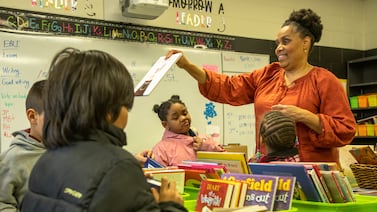A retired Denver principal who is a career educator and now coaches school leaders is running to represent central-east Denver on the school board.
Mike DeGuire was principal of five schools in four large school districts in Colorado. His last principal job was at Denver’s McMeen Elementary, where he spent 12 years. After retiring from McMeen, he worked with Denver Public Schools, the Colorado Department of Education, and private organizations to coach dozens of Colorado school principals and district leaders on improving their leadership skills, school culture, and student achievement.
DeGuire, 76, said he’s running for school board because he wants to give back.
“There have been some struggles and some challenges,” DeGuire said, “and I feel like I have skills and knowledge in running schools and also working with people that would be helpful.”
In all, 12 candidates are running for four open seats in the Nov. 2 election. The winners will help lead a district that is still navigating the COVID-19 pandemic and trying to make up for a year and a half of disrupted learning. The board will oversee a new superintendent, craft a new strategic plan, and grapple with several long-simmering issues, including declining enrollment and continued disagreement over the role of independent charter schools and semi-autonomous innovation schools.
In his decadeslong career, DeGuire has worked in all types of schools — public, private, and parochial — in three states. In Colorado, he worked in Jeffco Public Schools, Boulder Valley School District, Littleton Public Schools, and finally Denver Public Schools.
DeGuire’s children attended the now-closed Philips Elementary in northeast Denver in the 1970s before the family moved to Lakewood. A father of four with four grandchildren, DeGuire now lives in Denver’s Mayfair neighborhood with his partner. His youngest grandchild attends a Denver elementary school. His daughter works as a counselor at a Denver secondary school.
One of DeGuire’s part-time jobs is coaching Denver principals as an independent contractor — a gig he’d have to give up if he were elected due to new conflict-of-interest rules. He also works part time as an educator effectiveness specialist for the state education department, coaching superintendents and principals in northwest Colorado, and as a real estate agent.
DeGuire is running against the only incumbent in the election, board President Carrie Olson, who also is a career educator. DeGuire said he admires Olson and supported her campaign four years ago. But he said his leadership experience has given him the skills to deal with conflict and change, which are “something we need today on the board.”
“There’s been some struggles on the part of the board to come together, to work collaboratively, to be a cohesive group on the major issues that count for kids,” DeGuire said.
If elected, DeGuire said he’d want to address what he called an “overemphasis on testing and a narrow emphasis on academics to the detriment of the other experiences that kids need — the arts, technical trades, extracurriculars, science, social studies, technology, civics.”
He’d also like the district to provide more mental health and emotional support for students. Such support is critical but the district treats it too much “as an aside,” he said.
Denver Public Schools is Colorado’s largest school district, serving about 90,000 students. A little more than half of students are Hispanic, 26% are white, and 14% are Black. Its school board has seven members — five regional and two districtwide.
The central-east part of Denver DeGuire is vying to represent stretches from Capitol Hill to Lowry.
We asked him about several key issues the district will face in the coming years.
Declining enrollment and a growing number of small schools: Small schools aren’t problematic by design, DeGuire said. The problem with small schools in Denver is funding. The district funds its schools per student, which means small schools often can’t afford to pay for robust programming. That funding policy may need to be reexamined, DeGuire said.
“We need to look at what really counts and what happens in schools beyond the premise that small schools can’t deliver quality education. I would disagree with that,” DeGuire said. “We need to be funding more centrally things like art, music, and PE for all schools.”
Charter and innovation schools: DeGuire is concerned about the culture of competition for enrollment that exists between independent charter and district-run schools. Allowing families to choose to attend charter schools instead of district-run schools isn’t a bad thing on its own, he said. But he said the process is complicated and the end result — which he said includes district-run schools losing enrollment and funding — is “disconcerting.”
While he supports schools trying innovative things, he said he worries that district-run schools are seeking innovation status not because they want autonomy over their programming but because they want autonomy over their budgets. Innovation schools can opt out of certain district services and spend that money to hire a reading intervention specialist, for example.
“That, to me, says that the district is not funding schools correctly and they’re not providing the services in a way that makes sense,” DeGuire said.
Improving education for Black and Hispanic students: Initiatives like the board’s 2019 Black Excellence resolution, which directed the district to better serve Black students, are “important and necessary,” DeGuire said. But he said the district needs to provide more clarity on the academic and social opportunities it expects schools to provide to students.
“It’s good that we have local control on how you’re going to implement those kinds of resolutions because different schools have different needs,” DeGuire said. “But where’s the accountability around that? Where’s the followup? We need to have some clarity on: What is the end goal?”







